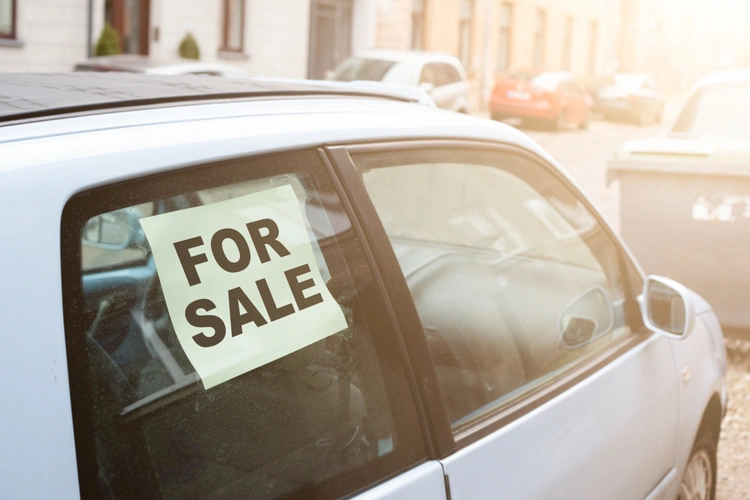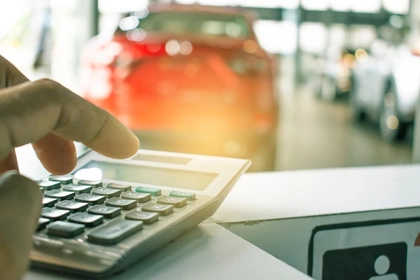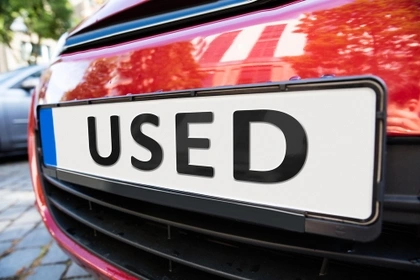Sell a car purchased with HP finance
An HP car finance loan lets you spread the cost of a new car into fixed monthly payments for between two and five years. You’ll typically put down a deposit upfront, and once you’ve finished making all the repayments and paid the Option to Purchase admin fee, you’ll become the car’s owner.
If you don’t want to wait until the end of your agreement, you can choose to settle the finance at any time – if it’s affordable for you to do so. Simply contact your lender to request a settlement figure. If you’re planning to sell your car to a dealership, they may offer to settle the finance on your behalf and will pay the finance company directly.
Sell a car purchased with PCP finance
If you purchased a vehicle with PCP car finance, you won’t become the owner until you’ve made all your monthly repayments and paid the final one-off balloon payment. This is because, unlike with HP, a PCP loan doesn’t cover the car’s full value. Instead, you will only borrow the predicted loss in value that it will have during your loan term. You can then hand the car back at the end of your term and walk away if you wish.
If you choose to buy the car instead, you’ll need to cover the outstanding value, known as the Guaranteed Minimum Future Value (GMFV) or balloon payment, in cash or via a refinance loan. Then you will be able to sell it on if you wish. Even so, you don’t need to wait until the end of your agreement to buy – and sell – the car. You can contact your finance company to request a settlement figure at any time and find out how much you’ll need to pay to become the car’s legal owner.
Sell a car purchased with a personal loan
Unlike PCP or HP, when you buy a car with a personal loan, you’ll be its legal owner straight away. Assuming you paid for the vehicle in full, you can do whatever you like with the car, such as drive long distances, make major modifications, or sell it.
Can I part exchange a car on finance?
Part exchange is when you trade in your existing car and put the proceeds towards buying another. Unfortunately, if you still have outstanding finance to pay, you can’t part exchange without settling the finance first. You might find this process easier if you’re in positive equity (where your car is worth more than you owe on it).
You can find out whether you’re in positive or negative equity by taking the finance settlement figure away from the car’s current value. If the settlement figure is less than the car’s value, the dealer selling you your new car might be willing to settle the outstanding finance on your behalf and take the proceeds as a deposit for your next vehicle.
What happens if I sell a car with outstanding finance?
It’s illegal to sell a car with outstanding finance without making the buyer aware. However, settling your finance and becoming the car’s official owner first can allow you to sell the car on safely.
What are my rights if I buy a car with outstanding finance?
When buying a used car, it’s not always possible to know all the details of its history. If you’ve unknowingly bought a car with outstanding finance, it might not end in disaster. In fact, you may have the right to keep the vehicle, providing you can prove you bought it in good faith.
The finance company that owns the car will usually carry out checks to make sure everything you’re saying is true and accurate, and they’ll then decide who should pay the outstanding finance. Typically, this will be the person who signed the original finance agreement. If they decide against you and ask you to make payments, consider seeking legal advice.
For extra peace of mind, you can carry out an online outstanding finance check before buying a used car. You’ll need the car’s registration to use these services and it may cost between £10 and £30, depending on the site you use.
What is a settlement figure?
A settlement figure is the amount you’ll need to pay to end your car finance agreement early and become the vehicle’s legal owner.
Typically, this will be made up of your remaining repayments minus any future interest. Depending on the terms of your loan, you might also need to pay an administration fee or early repayment charge.
You can contact your finance company directly to receive a settlement figure and it will usually remain valid for up to 28 days. Check your loan paperwork to find their contact details.
What if my car is worth less than the settlement figure?
All cars lose value over time – known as depreciation – but this can happen at different speeds. The car’s make and model, mileage, condition, and trim can all affect the rate of depreciation. If your car has lost value quickly, it could now be worth less than the settlement figure. This is known as negative equity.
You may still be able to part-exchange a car with negative equity, but you’ll likely need to agree to pay the difference between the car’s current value and the settlement figure before the dealership will accept it.
What is voluntary termination?
Life happens and our circumstances can change, especially over a period that may last up to five years. You might have changed job, been made redundant, or had another child – all situations that could affect the type of car you need to drive or the amount you’re able to pay. If you’re looking to sell a car on finance because you can no longer afford the repayments and can’t pay the settlement figure, voluntary termination might be an option.
Under UK law, you have the legal right to terminate your car finance agreement if you’ve already paid 50% of the total amount payable. This shouldn’t be confused with 50% of the car’s value. In an HP loan, you’ll typically reach this point halfway through your loan. With a PCP loan, you’ll need to have repaid 50% of the total amount payable, including the balloon payment to use voluntary termination. However, you don’t need to wait until you reach this point to exercise your right to voluntary termination, you just need to pay the difference to reach the 50% threshold.
If you’re eligible, you can let the lender know that you wish to opt for voluntary termination, pay any outstanding fees, hand the car back, and walk away.
Can car finance be transferred to another person?
It’s not usually possible to transfer a car finance agreement to another person. Each car loan is tailored to your individual circumstances and based on your unique financial situation at the time you applied. Instead, you’ll likely need to settle your car finance first and then the other person can take out their own loan agreement to purchase the vehicle.
If you find that you’re struggling to make repayments and someone else in your family is happy to step in, contact your lender directly and they’ll be able to advise you on the best way forward.
Be aware that if you claim to be the main driver of a vehicle when you are not, such as to obtain car finance on someone else’s behalf, this is known as fronting and is against the law. If your loved one is worried about being approved for a car loan, you may be able to take out a joint loan or act as their guarantor in a guarantor car finance agreement.
Get Car Finance up to £100,000
- Check your eligibility without impacting your credit score
- No deposit needed
- Rates from 9.9%* APR
*Representative example: Borrowing £6,500 over 5 years with a representative APR of 19.9%, an annual interest rate of 19.9% (Fixed) and a deposit of £0.00, the amount payable would be £166.07 per month, with a total cost of credit of £3,464.37 and a total amount payable of £9,964.37. Rates may differ as they are dependent on individual circumstances. Subject to status. We're a credit broker, not a lender.
Disclaimer: All information and links are correct at the time of publishing.





